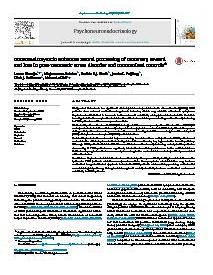Intranasal oxytocin enhances neural processing of monetary reward and loss in post-traumatic stress disorder and traumatized controls
Abstract
Background
Anhedonia is a significant clinical problem in post-traumatic stress disorder (PTSD). PTSD patients show reduced motivational approach behavior, which may underlie anhedonic symptoms. Oxytocin administration is known to increase reward sensitivity and approach behavior. We therefore investigated whether oxytocin administration affected neural responses during motivational processing in PTSD patients and trauma-exposed controls.
Methods
35 police officers with PTSD (21 males) and 37 trauma-exposed police officers without PTSD (19 males) were included in a within-subjects, randomized, placebo-controlled fMRI study. Neural responses during anticipation of monetary reward and loss were investigated with a monetary incentive delay task (MID) after placebo and oxytocin (40 IU) administration.
Results
Oxytocin increased neural responses during reward and loss anticipation in PTSD patients and controls in the striatum, dorsal anterior cingulate cortex and insula, key regions in the reward pathway. Although PTSD patients did not differ from controls in motivational processing under placebo, anhedonia severity in PTSD patients was negatively related to reward responsiveness in the ventral striatum. Furthermore, oxytocin effects on reward processing in the ventral striatum were positively associated with anhedonia.
Conclusions
Oxytocin administration increased reward pathway sensitivity during reward and loss anticipation in PTSD patients and trauma-exposed controls. Thus, oxytocin administration may increase motivation for goal-directed approach behavior in PTSD patients and controls, providing evidence for a neurobiological pathway through which oxytocin could potentially increase motivation and reward sensitivity in PTSD patients.
Geachte bezoeker,
De informatie die u nu opvraagt, kan door psychotraumanet niet aan u worden getoond. Dit kan verschillende redenen hebben,
waarvan (bescherming van het) auteursrecht de meeste voorkomende is. Wanneer het mogelijk is om u door te verwijzen naar de bron
van deze informatie, dan ziet u hier onder een link naar die plek.
Als er geen link staat, kunt u contact opnemen met de bibliotheek,
die u verder op weg kan helpen.
Met vriendelijke groet,
Het psychotraumanet-team.
Reference:
Laura Nawijn, Mirjam van Zuiden, Saskia B.J. Koch, Jessie L. Frijling, Dick J. Veltman, Miranda Olff | 2016
In: Psychoneuroendocrinology, ISSN 0306 4530 | 66 | april | 228–237
http://dx.doi.org/10.1016/j.psyneuen.2016.01.020
In: Psychoneuroendocrinology, ISSN 0306 4530 | 66 | april | 228–237
http://dx.doi.org/10.1016/j.psyneuen.2016.01.020
Affiliation author(s):


